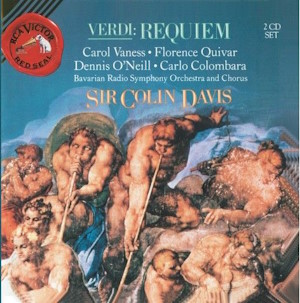
Giuseppe Verdi (1813-1901)
Messa da Requiem (1874)
Carol Vaness (soprano)
Dennis O’Neill (tenor)
Florence Quivar (mezzo-soprano)
Carlo Colombara (bass)
Chor und Symphonieorcjester des Bayerischen Rundfunks/Colin Davis
rec. 7-10 October 1991, Herkulesaal der Residenz, Munich
Latin text & English translation
Presto CD
RCA 09026 609022 [2 CDs: 86]
My first observation on playing this Presto re-issue is that either it was originally recorded or has been transferred at too low a volume and everything is rather distanced, mitigating the impact of the excellent choir and orchestra – but Davis gets the mood and tempo of the opening right and his manner reminds me of the similarly slow and grandiloquent account by Reiner in his classic recording. The entries in turn by each of the soloists are less encouraging; they are all “reliable” but only one voice raises the temperature above tepid and really excites the listener – and that is Carol Vaness, whose huge, vibrant soprano dominates and sometimes even repeatedly drowns out the rest of the quartet. Dennis O’Neill has no special beauty of tone and you will immediately notice that his voice spreads when at volume and under pressure – but he does attempt a trill, which Carlo Colombara does not; furthermore, his bass is throttled and “ingolato” with growled low notes. Florence Quivar is pleasant but her lower register needs much more bite and something really strange happens at 3:06 in the Lux aeterna for the trio of lower voices, when she appears to sing and sustain an entirely wrong note for six beats.
Davis directs impeccably – he was already a master of this score and repeats that success in his live 2009 LSO performance which has a more consistent quartet and better sound but a chorus less impressive than the Chor des Bayerischen Rundfunks here – who are terrific in the Dies Irae. We are also free of Davis’ increasingly besetting habit as he aged of intrusive vocalisation – though whether that is due to greater self-discipline or microphone placement and the resonant acoustic here, I cannot say.
A quartet containing a trio of second-rate soloists will not do when there are so many better recordings available. The music really changes up a gear when Vaness is involved and she does more with her words than the other singers. She also has noticeably more lower register at her disposal than the mezzo-soprano and concludes the Dies irae section of the Libera me with a lovely pure, poised B flat , then an absolutely belting top C before her muttered prayer; indeed, the finale of this recording forms its highpoint while the rest is somewhat ordinary. Vaness and a great choir apart, this is a non-starter; there are a score of recordings with better sound and soloists and I refer you to my survey in which I recommend half a dozen of my favourites.
Ralph Moore
Help us financially by purchasing from



















